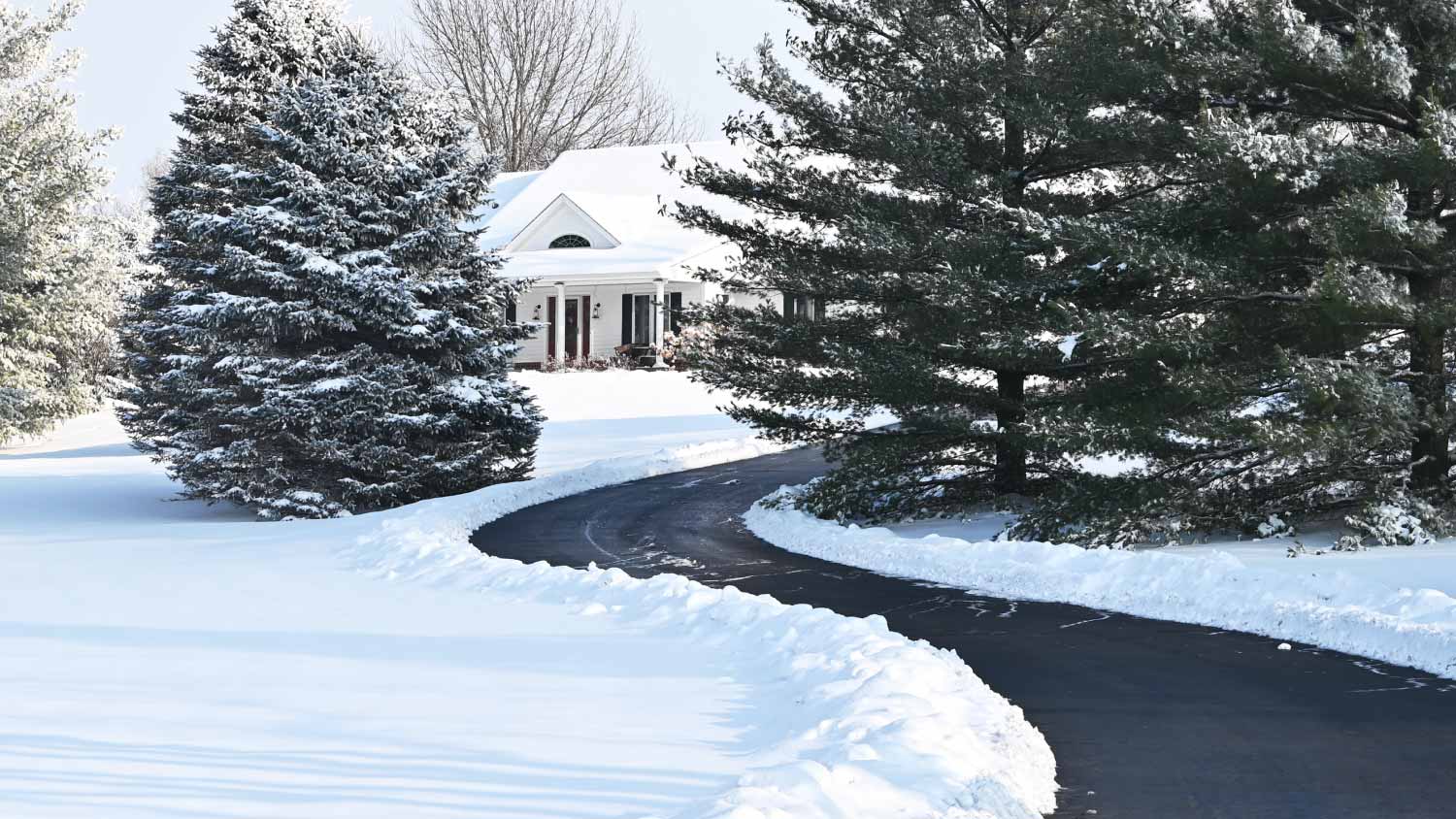
Is your driveway totaled? The price of repaving your driveway can save you from repair and resurfacing costs that are no longer worth the investment.
We'll help you make a concrete decision on concrete vs. asphalt


Both concrete and asphalt can be used in colder climates.
Concrete's rigid profile can make it more susceptible to cracking than asphalt in climates that experience freeze-thaw cycles.
While concrete requires little maintenance, asphalt needs to be resealed every three to four years.
Average concrete repair costs totaling $829 to $2,788 can be double the $1,500 it costs for a typical asphalt repair.
If you live in a cold climate, you may be wondering about the best type of driveway for longevity and easy maintenance. The freeze-thaw cycles that take place in colder climates can do a number on driveways, walkways, and other surfaces. This guide to concrete vs asphalt in cold climates will help you make a choice!

Concrete is a simple mixture of paste and aggregates that is one of the most commonly used infrastructural materials in the world. On average, a concrete driveway costs $4 to $15 per square foot. Here's what you can expect for performance in cold weather.
Pros
Low Maintenance: Concrete doesn't require the sealant coating needed for asphalt to survive cold weather.
Lifespan: Concrete can easily last up to 30 years even in the chilliest conditions.
Recyclable: Concrete is a better choice for an eco-friendly driveway.
Cons
Issues With Heaving: While fixable, a problem called heaving that results when ice and water get into pockets under concrete is a risk.
Staining: Salt and melting compounds that are commonly used in cold-weather climates during the winter can easily stain concrete.
Cracks: Wild temperature swings are known to cause cracks to form in concrete.
Repair Costs: The average cost to repair or fix a concrete driveway totals $829 to $2,788.

Asphalt is a mixture of aggregates and fillers used for roads, walkways, driveways, and countless other surfaces. It is considered much softer than concrete as a walking surface. At $7 to $13 per square foot, it is comparable in cost to asphalt. Here's a look at the pros and cons based on how it performs in cold weather.
Pros
Bendable: Asphalt doesn't have the rigidity of concrete. As a result, it generally performs much better in areas with frost-thaw cycles that cause materials to expand and contract.
Helps to Melt Ice: The darker color of asphalt can actually attract the sun, helping snow and ice melt faster.
Easily Repairable: Small cracks in asphalt are generally less expensive to repair than damaged concrete. On average, asphalt repair costs $1,500.
Cons
Ongoing Maintenance: Unlike concrete, asphalt needs to be sealed every three to four years.
Patching Is Difficult: Due to the temperature needed for asphalt curing time, damaged concrete can only be patched when temperatures reach above 50 degrees Fahrenheit. If a driveway is damaged by a plow, major repairs may need to be left unfinished until spring.
Asphalt's bendable quality makes it a better choice in areas where the freeze-thaw cycle poses threats for cracking. It can also be a better option for walkways because of the way its dark color helps ice and snow to melt quickly. Asphalt that is professionally installed by a local asphalt company should last for up to 30 years. However, homeowners who choose this option should be prepared to reseal asphalt every few years.
From average costs to expert advice, get all the answers you need to get your job done.

Is your driveway totaled? The price of repaving your driveway can save you from repair and resurfacing costs that are no longer worth the investment.

Calculate the cost of installing a new asphalt driveway based on dimensions, depth, finishes, and other custom driveway details.

Use our guide to calculate the cost to seal an asphalt driveway. Prices vary based on the type of sealant and the size of the driveway.

Though it seems straightforward, your driveway actually has a lot of parts. From the apron to the trench drain, here are the driveway terms you should know.

You should not fill potholes in your driveway with mulch. Repair potholes with proper base material and then reseal.

Our eight gravel driveway maintenance tips, including raking and spraying, make it easy to keep your gravel driveway looking good and functioning properly.